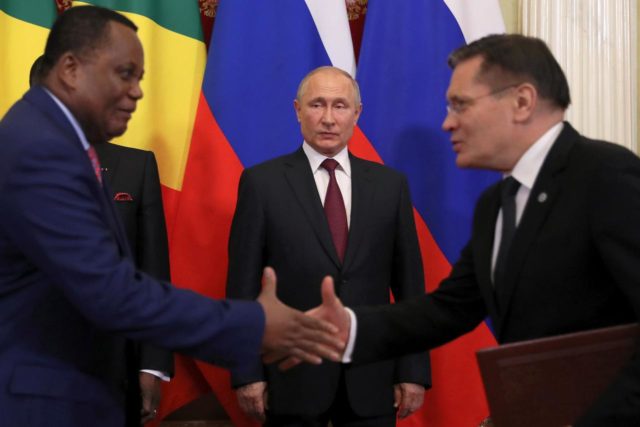
Russia’s Military Diplomacy in Africa: What Does It Mean?
Publication: Eurasia Daily Monitor Volume: 16 Issue: 82
By:

Despite modern Russia’s constrained resources, its foreign policy has long operated on a global scale. And one key area of this worldwide remit is increasingly Africa, where arms sales and security cooperation are again driving the diplomatic outreach. Thus, the past several weeks saw several new initiatives designed to upgrade Russia’s military presence in various African countries.
First, Russia is delivering, for free, a new shipment of thousands of light arms to the Central African Republic (CAR) that will, reportedly, help equip the latter state’s law enforcement and military personnel (Kommersant via TASS, April 16). The authorization for this military aid came last January (RBC, May 23) But notably, the announcement that this new weapons shipment was underway coincided with Russian President Vladimir Putin’s order to send 30 additional troops to join the United Nations peacekeeping mission active in the country (RBC, May 23; Pravo.gov.ru, April 15). Besides these two decisions, Russia’s Ministry of Defense is opening a local office in the CAR. All of this builds on Russia’s initial donation of light arms (along with over 170 advisors/instructors) to the CAR last year, thanks to the UN exempting Moscow from the international arms embargo put in place as a result of the African country’s ongoing civil war (Kommersant via TASS, April 16). These Russian arms donations—made up of 900 handguns, 5,200 assault rifles, 140 sniper rifles, 840 Kalashnikov machine guns, 270 rocket-propelled grenades (RPG) and 20 anti-aircraft batteries—reportedly equipped two local battalions totaling 1,300 men (Cameroon Concord News, December 16, 2017). The Kremlin clearly believes that its military largesse in the CAR will soon be rewarded. And indeed, the government of this African country has expressed openness to the idea of a Russian base on its territory (RIA Novosti, January 10).
Beyond the CAR, Russia is sending military specialists to the Republic of Congo to service previously dispatched weapons (Interfax, May 23). Moscow also signed an agreement with Brazzaville to enhance bilateral cooperation in the fields of mass communication (Kremlin.ru, May 23) as well as the “peaceful use of atomic energy” (Rosatom.ru, May 24). Furthermore, Russia’s leading energy pipeline manufacturer, TMK, signed a memorandum of understanding with the Congolese government to explore the possibility of a 1,300-kilometer oil pipeline from the port city of Pointe-Noire to the border with Cameroon (Interfax, May 24).
Finally, Moscow is building upon its agreement with the previous government of Sudan. The former president, Omar al-Bashir, who was deposed in a coup earlier this year, had offered Russia a naval base on the Red Sea in return for Russian support of his government and supposed help with battling contraband and slavery (see EDM, December 6, 2017). Although, the real issue was undoubtedly protection for al-Bashir (Orientalreview.org, December 5, 2017). While Moscow clearly desires a naval base on the Red Sea (see EDM, November 29, 2017), the new government in Sudan is obviously not ready for that. Still, it is not an anti-Russian government, since the coup against al-Bashir was not related to Russia. Thus, Khartoum just signed a military agreement with Moscow that will allow Russian military vessels to enter Sudanese ports as well as permit Sudan to invite foreign military aircraft and specialists to arrive for joint projects and military training. Moreover, “The parties undertake not to forward to a third party without prior written consent any information obtained or jointly created as part of the implementation of the current agreement” (UAWire, May 26, 2019).
The above-mentioned accords add to the 20 or so military agreements and countless other non-military bilateral cooperation pledges Russia had already reached with various African states. Taken together, these initiatives highlight how Moscow employs military aid, arms sales, information capabilities, and energy to try to gain long-term entry into and influence over governments across the continent. The pattern strongly suggests that the ultimate goal for Moscow is to obtain foreign military bases in many of these countries.
Russia’s Africa policy is not primarily guided by the quest for raw materials or foreign markets. It is true that certain elements, like Russian private military companies or Putin confidantes such as Yevgeny Prigozhin, seek to extract wealth from African diamonds and oil (see EDM, April 30, 2018; January 23, 2019)—indeed, this goal is important. Similarly, Russian arms sellers are engaged in a sharp competition in Africa with the United States and other Western countries, which seek to force Russia out of these local arms markets (Vedomosti, May 14). As a result, many Western analysts have fallen for the idea that Russia’s main objective in Africa is economic. However, this conclusion is misconceived and by no means explains the main story.
As Russia’s recent military and non-military agreements with the CAR, Congo and Sudan once more show, Moscow, first of all, seeks bases, influence and support from these countries in international fora like the UN. And linked to these goals is the Kremlin’s underlining determination to impose on foreign audiences the idea that Russia is a great global power whose word must be heeded everywhere that it has interests.
Russia’s bilateral agreements on weapons shipments as well as economic and information cooperation are significant not just in their own right but also for their strategic-political importance. They allow Russia to gain a local foothold upon which it can then expand its influence in multiple directions. This has been the case in Europe, the Middle East and Latin America, and it is now occurring in Africa. The totality of Russian deals with African government does not primarily reflect private interests or the pecuniary ambitions of the Russian elite—although these undoubtedly also figure into the mix. Rather the Russian deals and their consequences represent part of Moscow’s overall global and national security strategy. The sooner observers recognize this reality, the more able they will be to understand and counter these Russian probes.



